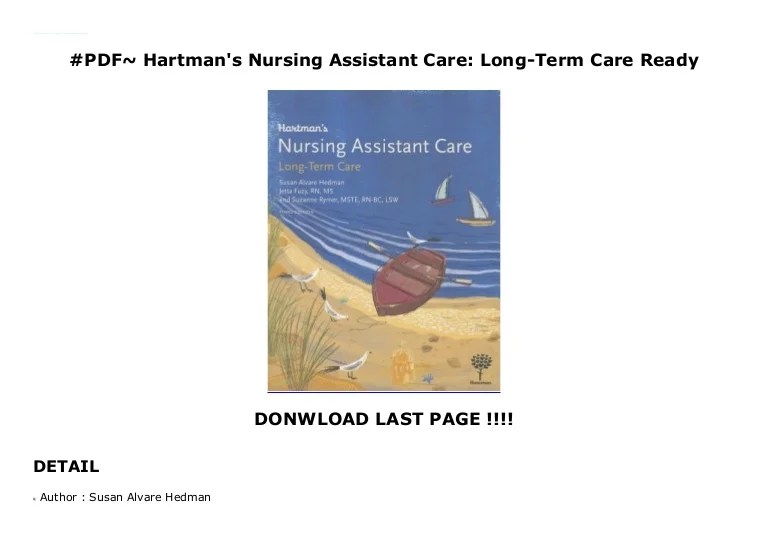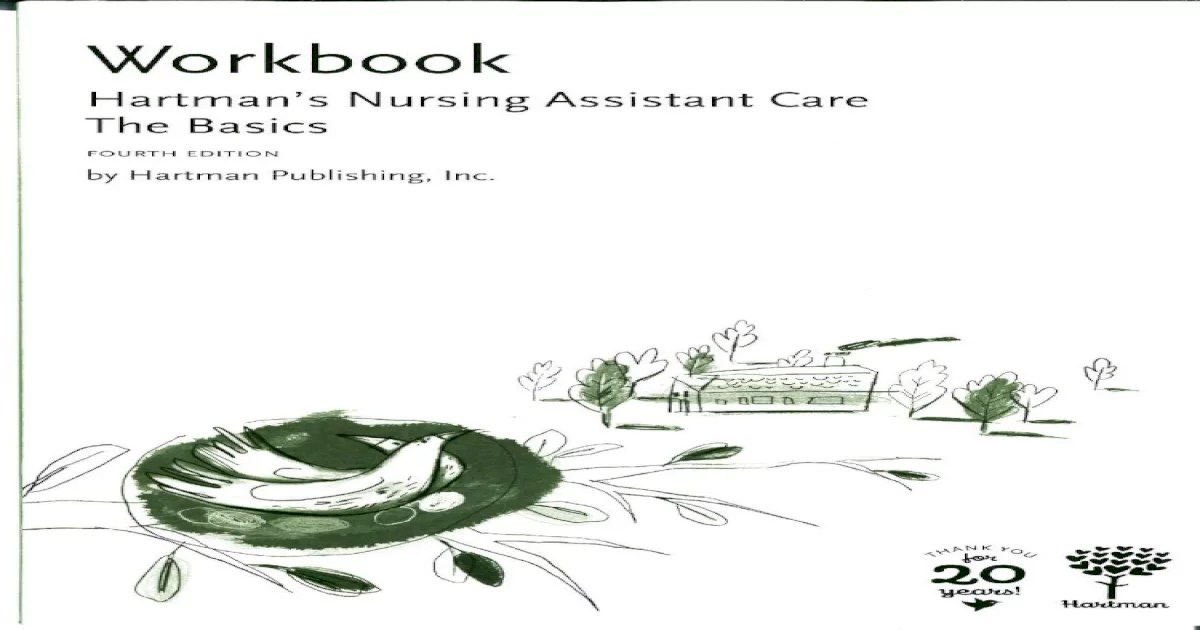Workbook Hartman’s Nursing Assistant Care presents a comprehensive exploration of the fundamental principles and practices of nursing assistant care. This authoritative guide provides a detailed overview of the roles and responsibilities of nursing assistants, emphasizing ethical and legal considerations. With a focus on patient-centered care, the workbook offers practical guidance on patient assessment, personal care, mobility assistance, nutrition, medication administration, wound care, communication, and special care considerations.
Through its clear and engaging explanations, Workbook Hartman’s Nursing Assistant Care equips readers with the knowledge and skills necessary to provide compassionate and effective care to patients in various healthcare settings.
1. Nursing Assistant Care Fundamentals

Nursing assistant care is a crucial aspect of patient care, providing support and assistance to individuals in healthcare settings. According to Hartman’s workbook, the core principles of nursing assistant care involve maintaining patient safety, promoting comfort, and ensuring patient dignity and respect.
Nursing assistants play a vital role in the healthcare team, performing tasks such as monitoring vital signs, assisting with personal care, and providing emotional support to patients. Ethical and legal considerations are paramount in nursing assistant care, including maintaining patient confidentiality, respecting patient rights, and adhering to professional standards.
Roles and Responsibilities of a Nursing Assistant
- Monitoring vital signs
- Assisting with personal care
- Providing emotional support
- Maintaining patient confidentiality
- Respecting patient rights
- Adhering to professional standards
2. Patient Assessment and Monitoring: Workbook Hartman’s Nursing Assistant Care

Patient assessment and monitoring are essential components of nursing assistant care. Nursing assistants are responsible for assessing a patient’s vital signs, including temperature, pulse, respiration, and blood pressure. These measurements provide valuable information about the patient’s overall health and well-being.
Monitoring a patient’s neurological status, including level of consciousness and orientation, is also crucial. Nursing assistants can assess a patient’s neurological status by observing their behavior, speech, and response to stimuli.
Pain assessment and management are equally important. Nursing assistants are trained to recognize and assess pain levels using various tools, such as pain scales and behavioral observations.
Techniques for Assessing Vital Signs
- Temperature measurement
- Pulse measurement
- Respiration measurement
- Blood pressure measurement
Methods for Monitoring Neurological Status
- Level of consciousness assessment
- Orientation assessment
Importance of Pain Assessment and Management
- Recognizing and assessing pain levels
- Using pain scales and behavioral observations
3. Personal Care and Hygiene

Personal care and hygiene are essential for maintaining patient comfort and well-being. Nursing assistants provide assistance with bathing, dressing, and grooming, ensuring that patients are clean and comfortable.
Skin care and pressure ulcer prevention are crucial aspects of personal care. Nursing assistants are responsible for assessing the patient’s skin for any signs of redness, dryness, or irritation. They also implement measures to prevent pressure ulcers, such as repositioning the patient and using pressure-relieving devices.
Assisting with toileting and incontinence care is another important aspect of personal care. Nursing assistants provide assistance with toileting and ensure that the patient’s privacy and dignity are maintained.
Step-by-Step Guide to Bathing a Patient, Workbook hartman’s nursing assistant care
- Gather necessary supplies
- Prepare the patient
- Wash the patient’s body
- Rinse the patient’s body
- Dry the patient’s body
Principles of Skin Care and Pressure Ulcer Prevention
- Assessing the patient’s skin
- Implementing pressure ulcer prevention measures
Techniques for Assisting with Toileting and Incontinence Care
- Assisting with toileting
- Maintaining patient privacy and dignity
Popular Questions
What are the core principles of nursing assistant care?
Workbook Hartman’s Nursing Assistant Care Artikels the core principles as providing compassionate, respectful, and individualized care while maintaining patient safety, privacy, and dignity.
What are the different types of patient assessments covered in the workbook?
The workbook covers techniques for assessing vital signs (temperature, pulse, respiration, blood pressure), neurological status (level of consciousness, orientation), and pain.
How does the workbook address ethical and legal considerations in nursing assistant care?
The workbook emphasizes the importance of adhering to ethical guidelines, respecting patient rights, maintaining confidentiality, and understanding legal responsibilities to ensure patient safety and well-being.